TUESDAY'S SCRIPT TIP:
WHAT'S YOUR PLAN, MAN?

Happy New Year!
You know how important it is for your protagonist to have a tangible goal? Guess what? You are the
protagonist in the movie of your life. What is your goal for this year? What is your goal for this quarter?
What is your goal for this month? What is your goal for today?
You need a plan... and a new year or new season or new Month is a great excuse to forget all of the things that went wrong last
year or just didn't go exactly as planned and have a fresh start. Hey, I screw up so much that I also use
My Birthday and Ground Hog Day as good excuses to hit the reset button on my life and start with a new plan
(or just restart the old plan). But I *need* a plan if I want to get anything done, and you probably do, too.
Have you ever gone to the grocery store to buy one specific thing and then got home with a couple of
bags of groceries but *not* that one thing you needed? That's why they invented grocery lists...
but we are going to look at Screenwriting To Do Lists. You may have made all of the regular
New Year's Resolutions (lose 30 pounds, etc) and maybe you have "finish my screenplay" on that list,
but I want you to make a list just for screenwriting - a plan of action for the year 2026.
Tuesday Script Tips are on the business of screenwriting, but screenplays are just part of a movie,
and we need to sell our screenplays if we ever want to see them on screen... so just about every aspect
of writing a script is business related. *Writing* screenplays is the most important part of the business.
You can't control whether you sell a script or not, but you can control whether you write one.
You know what the first step in selling a script is? Having one to sell in the first place.
Figure out what you can accomplish by the end of the year, then take it step-by-step. You can't
write a script in a day, but if you can write a page a day you'll have 360 pages by the end of the year.
If you can only write a third of a page a day - you still end up with a new script by the end of the year.
That's one more script than most people have.
Now, you can just write that page or third page or whatever whenever you get around to it, or you
can have a plan to write and stick to it. Guess which method works best?
THE BIG TO DO

You have probably read in my blog about my big To Do List... and I just made up the one for 2026. Many of the
things on the brand new 2026 To Do List were leftovers from the 2025 To Do List... and some were even still from the 2011 To
Do List - 2011 was not a great year for me. It was supposed to be - with the 1980s hit movie remake gig and several
other projects... that didn't happen that year. I wasted time on some projects that didn't happen, did some
meetings on things that went nowhere, and didn't get to everything on my big To Do List. I also planned on producing
DREAM LOVER - my no-budget thriller film - but my co-producers were busy and it was postponed... and now may never happen.
At first the funding on that film was based on the 1980s remake flick being made, but my revised plan is to do
it as a Kickstarter project since part of the reason for makin the film is research on a book on making your
own film. That film project is off of this year's Big To Do List. Though 2017 was much better than 2011 - I'd planned on
writing a half dozen new scripts that year, but ended the year with a single new spec and three
Blue Book expansions, the couple of short stories and a Story In Action book... I have the LO/NO BUDGET Book that was
*supposed* to be finished that year but came out a few years later year instead.
Hey, no plan is perfect... but without a plan? I'd get nothing done!
So, was last year a failure? Nope! Despite everything that threw me for a loop, I did crank out a some new scripts and
did three Blue Books and some other writing. Without the big To Do List, *nothing* would have been to-done. I think the best thing you can
do is to have a plan, even if things change. Especially if things change. Having a plan with clear goals allows you
to get back on track after things change. Having a plan gives you goals to work toward. You may not cross off
everything by the end of the year, but you'll be able to cross off something. Without a plan you're just spinning
your creative wheels. So make up a big To Do List for 2026. You may not finish everything, but try to.
I break up my big To Do List by months, and decide what I want to accomplish in each month. I used a lined sheet
of paper, and put it in a plastic sleeve that goes inside my laptop as a screen protector. Every month has a
specific goal. Because I write full time, I figure I can pound out a first draft in a month, and often have six
first drafts planned for every year. Actually, not all of those are first drafts - some are page one rewrites on
older scripts, so on my 2026 To Do List one of my scripts is the rewrite of DEAD RUN which I think I have
finally figured out how to fix. This year most of my time will be spent on Blue Books and book projects rather
than screenplays, but there are still a couple on the list. You probably have a job taking up most of your
time, so you'll want to break up your new specs and write a certain amount every month. Have a specific goal,
though - maybe Act 1 in one month, the first half of Act 2 in another two months, etc. That's what I used to do
when I worked at the warehouse - I figured out much time I could realistically devote to writing, then I came up
with an "easy" amount of writing I could accomplish within that time, and then I figured out how many months it
would take me to reach Fade Out and "scheduled the script" on my big To Do List. I wrote 3 new specs a year during
those years, because I had a plan and did my best to stick to it (though, sometimes I spent those great union
3 day weekends catching up). My goal back then was one good page a day, but actually 10 good pages a week - so I
worked a little longer on my days off. That added up to a new first draft every 3 months, and then I'd spend
the next month rewriting the previous script... and end up with 3 scripts a year in pretty good shape.
My plan was to spend 1 hour per page - a goal that was easy some days and close to impossible others. But a page
in an hour is *reasonable* for me. Figure out what is reasonable for you.

On my Big To Do List for 2026, the months when I am not working on a screenplay I am doing something else that
is writing related, like expanding those Blue Books from 40 pages to 200 pages. Except for
July, which is a vacation *and* writing some short stories. Actually, this month (once the LO/NO Book left over from
last year is finished) I plan on finishing the next Mitch Robertson story which has not been crossed off the
Big To Do List for a couple of years now! The reason why I alternate screenplays with other types of writing is to
give myself a break
and allow my subconscious to work on the next script while I'm writing up blog entries or something. Many scribbled
scene and dialogue ideas happen while I'm working on something else.
So, make up your Big To Do List for 2026. Make sure your To Do List is *possible* - this isn't a fantasy list.
Sometimes I find that listing the *steps* to completing a project is helpful - that way I feel like I'm completing
more. I can cross off "Outline new spec" and "Treatment for new spec" and "Act one of new spec" and get some
momentum going. Nothing makes me feel better than crossing something off my Big To Do List! Step-by-step I'm
getting closer to finishing that new spec!
THE 2 BEE DUNG LIST

When I flip over that plastic sleeve inside my laptop there is another list on the back. This is my favorite
list, because I get to cross out something almost every day! I love crossing out things on my lists! I makes me
feel like I am making progress, and I *am* making progress. The other list is my To Be Done List - and it's all
of the steps that lead to finishing a spec script or making sure I get my new article for Final Draft's website finished
on time. Decades ago, when I began making these lists, I drew a cartoon of an angry bee, and then surrounded him
by the number 2 and the word "Dung" (um, this is the Dung that has to be done... and as Monty Python once asked:
"What's brown and sounds like a bell?") and that has stuck to this day. Something about that angry bee cartoon
makes me want to cross something off to make him happy.
The small list contains both small things that need to be done ("e-mail Raindance Film Festival", "notes on novel
adaptation typed up")
and larger projects that are broken up into steps so that I can cross stuff off and keep the angry bee happy.
On the current list I have all of the new chapters for the Blue Books listed and I cross each one out after I finish
writing it. I also have "10 New Script Tips For 2026" with ten little boxes to X out when I finish a new tip...
none are Xed out right now! I hope to get those done in whatever spare time I may have!
Also on the To Bee Dung List are spare time projects which tend to carry over from list to list - but without them
on the list as a reminder they'd never get done. Currently I have a section for Bite Sized Pieces Projects, where
I plan to get a little bit done every week and they will add up to getting a lot done. So on the 2018 list I have
things like The THRILLER Thursday blog entries (I want to finish Season 2) and doing 1/4 of a Hitchcock film for the last Hitchcock Book every
week (I have 10 more to go, so that should get those into rough draft form by the end of the year) and also 1/4
of a movie entry for the next Story In Action books - again, a rough draft chapter every month. What I've learned is
that when you cut anything into Bite Sized Pieces and only need to get a little bit done every day (a page a day, etc)
you can get work done even if you have a day job and a family and a life to live. You can cross out that page or
that 1/4 of a movie or that blog entry every week... and there are 52 of those weeks in a year!
Because my Big To Do List is set up for me to write 5 pages a day when I'm working on a screenplay, the little
list usually has four tasks - one for each week I work on the script - and each task has a little box for each
day's 5 pages. When I finish my 5 pages, I get to X off the box! When I finish the week, I get to cross out that
whole line! I am *making progress*! You can break up your script into pages or scenes or acts or whatever makes
sense to you - and then cross off each part you complete. The problem when you are writing something long, like a
screenplay or novel, is that the end may seem so far away you just can't see it on most days. It may feel like you
are doing a lot of writing but not making any progress. That's why I like to break it up into "bite sized pieces" -
I can accomplish something, and even if the end is still a long ways away, I know that I am one step closer. That
step has been taken, I can cross it out... and try to keep the angry bee happy.

I come up with a new To Be Done List at the beginning of every month, and it usually has things left over from
the previous month. Though you never want to make a list that seems overwhelming, you do want to aim for the stars
so that you can maybe hit the moon. You want to make sure that you have to *work* to complete your list. If you can
easily cross off all of the tasks within a month, you may slack off... and cross off nothing. You want a list with
enough items that you have to keep working. One of the reasons for the lists is to create some "work momentum" -
when you wrote yesterday, it is easier to write today... all of those characters and ideas are still bouncing
around in your brain. If you go several days without writing, you may not remember what the heck you were doing or
who these characters were or what the heck they wanted. You have to get back into the script before you can write...
and that's wasted time. One of those old pieces of writing advice that is completely true is to write every day.
I take Sundays off, and if you want to take a couple of scheduled days off every week, that's okay. But set aside a
regular time period on the other days and write. Don't do anything else. If your house is burning down, finish your
pages before you outrun the fireball! Focus on WRITING during your scheduled writing time. I like to have enough
things on my To Be Done List that if I do manage to finish my pages for the day with time to spare, I can knock off
some small task from the list in whatever time I have left. That may just be sending some e-mails or doing some
quick Google research... but it's something else I can cross off the list to keep that angry bee happy.
Your list may not have a cartoon angry bee, but paste a picture on it or do something that makes that list "fun".
I spent a year laying carpet - heavy manual work that probably ruined my knees for life - and taped to the back
doors of the truck were a bunch of pictures of attractive women and vacation spots the crew leader put there to
remind him of why he was doing this back-breaking work. Every time we opened the truck doors to pull out those
heavy rolls of carpet, there were the gals and the dream vacations. Writing is work, and you want to find some way
to keep it fun. Whether that is some fantasy goal or some silly cartoon of a writer that makes you laugh - putting
something like that on you dreaded To Do List will probably make it easier to look at on those days when you don't
want to do anything at all. Find the ways to make writing fun and you will keep writng.
REWARD YOURSELF

When you finish your pages for the day, reward yourself. A *dog* gets a treat for "sitting pretty", so why
shouldn't you get a reward for doing the difficult work of actually writing something. Instead of creating
penalties for my failure, I've created rewards for my success. If I get my 5 pages done, I treat myself to a
movie, rent a video, or go out for ice cream with friends. If I end my week with 30 pages, I'll do something
special on Sunday: Go to the beach, take a special bike ride, or take friends out to brunch. I wrap up the week
with something fun that I don't do every weekend. Being your own boss means no one is there to tell you what a
great job you've done... so you have to pat yourself on the back sometimes. You have to give yourself a dog treat
for doing a great job.
But rewarding yourself for success only works if you do not reward yourself for failure. I have a friend who
will get nothing done... and feel bad about it... and go to a movie to feel better. He actually rewards his failure
and does not reward his success! That's a good way to turn you into a bad dog. Though you should not punish
yourself for failure, you probably shouldn't go out of your way to reward yourself. That's like screwing up on the
"lose 30 pounds" resolution by eating something not on your diet... then getting angry at yourself for going off
your diet and eating a half gallon of ice cream to feel better. Yes, as humans we do things like that... but you
are not going to lose those 30 pounds if that's your pattern! If you don't get your pages written for the day, no
ice cream for you!
Pick some rewards for completing the tasks on your list and *reserve them as rewards*. You want these things to
be motivations for you to work, not something you are going to do every day whether you work or not. Okay, some of
you have seen the problem with using ice cream as a reward - if you succeed at screenwriting you probably fail at
losing those 30 pounds. Well, no plan is perfect.
This year I have a whole bunch of great things on my Big To Do List for 2026. Some of those thing probably won't
get done this year, but many of them will... so I probably will *not* be losing those 30 pounds.
This is a good time for you to set your goals for the year. So, what's your plan, man?
(The dates and projects on this tip are old and wrong becuase I forgot to update it.... that wasn't on my To Do List!
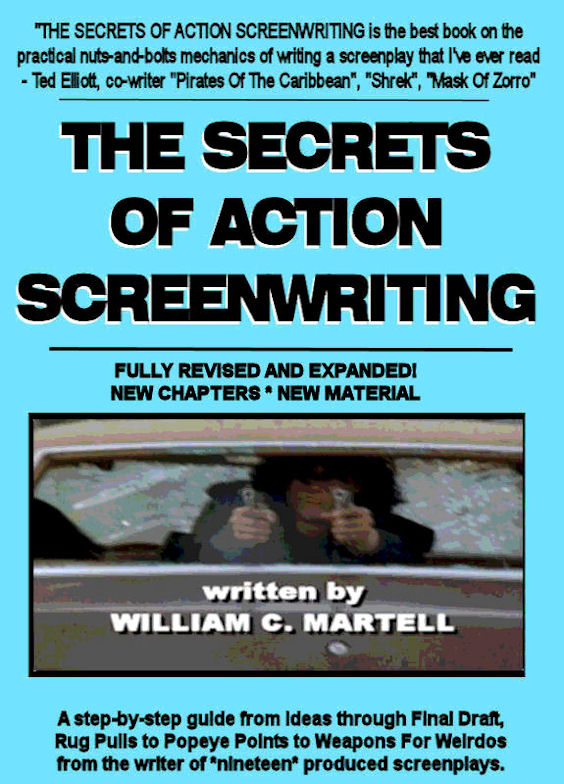
THE BOOK THAT STARTED IT ALL!
*** THE SECRETS OF ACTION SCREENWRITING *** - For Kindle!
*** THE SECRETS OF ACTION SCREENWRITING *** - For Nook!
Why pay $510 for a used version of the 240 page 2000 version that used to retail for $21.95? (check it out!) when
you can get the NEW EXPANDED VERSION - over 500 pages - for just $9.99? New chapters, New examples, New techniques!
"SECRETS OF ACTION SCREENWRITING is the
best book on the practical nuts-and-bolts mechanics of writing a screenplay I've ever read."
- Ted Elliott, co-writer of MASK OF ZORRO, SHREK, PIRATES OF THE CARIBBEAN and the sequels (with Terry Rossio). (ie; 4 of the top 20 Box Office Hits Of ALL TIME.)
Only $9.99 - and no postage!
BRAND NEW!
How Do I do That?

101 SCREENWRITING ANSWERS Blue Book!
New to screenwriting? You probably have questions! How do I get an Agent? How do I write a phone conversation? Do I need a Mentor? What’s does VO and OC and OS mean? What is proper screenplay format? Should I use a pen name? Do I need to movie to Hollywood? What’s the difference between a Producer and a Production Manager, and which should I sell my script to? How do I write a Text Message? Should I Copyright or WGA register my script? Can I Direct or Star? How do I write an Improvised scene? Overcoming Writer’s Block? How do I write a Sex Scene? And many many more! This book has the answers to the 101 Most Asked Questions from new screenwriters! Plus a Glossary of terms so that you can sound like a pro! Everything you need to know to begin writing your screenplay!
All of the answers you need to know, from a working professional screenwriter with 20 produced films and a new movie made for a major streaming service in 2023!
Only $4.99
NO KINDLE REQUIRED! Get the *free* app (any device, except your Mr. Coffee) on the order page on Amazon!
Making Your Own Movie?
WRITE IT: FILM IT BOOK!

Making Your Own Movie?
Writing An Indie Film?
Writing A Low Budget Genre Script To Sell?
Writing A Made For TV Holiday Movie?
You will be writing for BUDGET. On a standard spec screenplay, you don’t have to think about budget, but these types of screenplays writing with budget in mind is critical!
If you are making your own movie, budget, is even more important - and you need to think about budget *before* you write your screenplay... or you will end up with a script that you can’t afford to make (or is a struggle to make). Everyone is making their own films these days, and even if you have done it before there are lots of great techniques in this book to get more money on screen - for less money! You can make a film that looks like it cost millions for pocket change.
344 Pages - ONLY: $7.99!
Tips FAQ

HITCHCOCK FOR WRITERS!
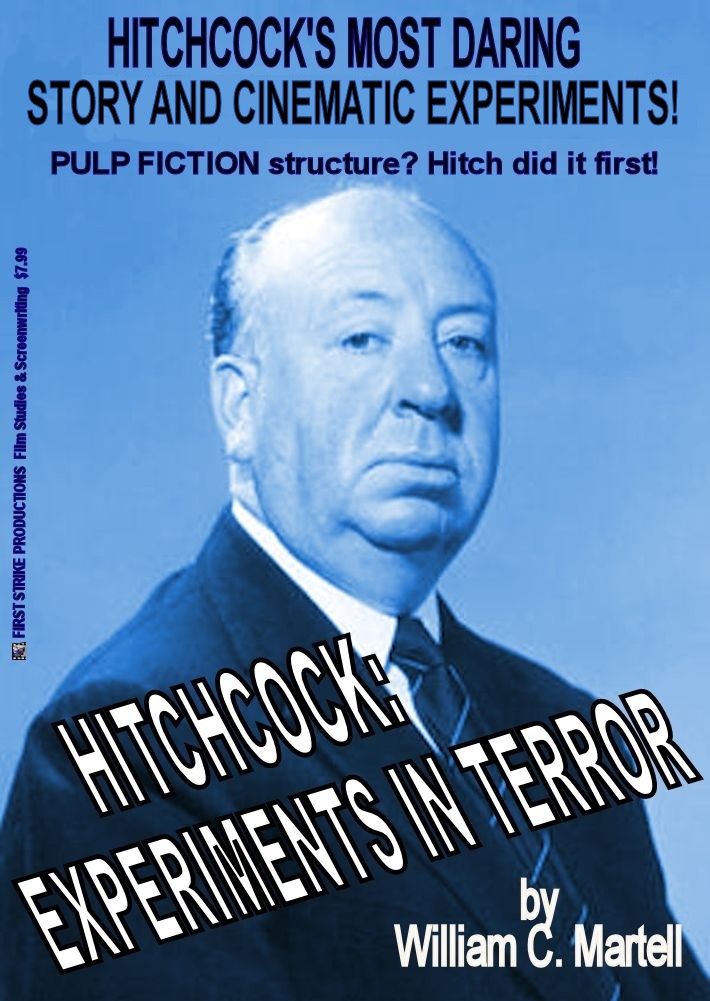
Strange Structures!
*** HITCHCOCK: EXPERIMENTS IN TERROR! ***
Contained Thrillers like "Buried"? Serial Protagonists like "Place Beyond The Pines"? Multiple Connecting Stories like "Pulp Fiction"? Same Story Multiple Times like "Run, Lola, Run"?
HITCHCOCK DID IT FIRST!
This book focuses on 18 of Hitchcock's 52 films with wild cinema and story experiments which paved the way for modern films. Almost one hundred different experiments that you may think are recent cinema or story inventions... but some date back to Hitchcock's *silent* films! We'll examine these experiments and how they work. Great for film makers, screenwriters, film fans, producers and directors.
Only $5.99 - Kindle Version
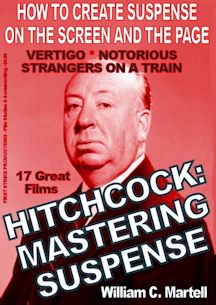
LEARN SUSPENSE FROM THE MASTER!
*** HITCHCOCK: MASTERING SUSPENSE ***
Alfred Hitchcock, who directed 52 movies, was known as the *Master Of Suspense*; but what exactly is suspense and how can *we* master it? How does suspense work? How can *we* create “Hitchcockian” suspense scenes in our screenplays, novels, stories and films?
This book uses seventeen of Hitchcock’s films to show the difference between suspense and surprise, how to use “focus objects” to create suspense, the 20 iconic suspense scenes and situations, how plot twists work, using secrets for suspense, how to use Dread (the cousin of suspense) in horror stories, and dozens of other amazing storytelling lessons. From classics like “Strangers On A Train” and “The Birds” and “Vertigo” and “To Catch A Thief” to older films from the British period like “The 39 Steps” and “The Man Who Knew Too Much” to his hits from the silent era like “The Lodger” (about Jack The Ripper), we’ll look at all of the techniques to create suspense!
Only $5.99 - Kindle Version
THE BLUE BOOKS!
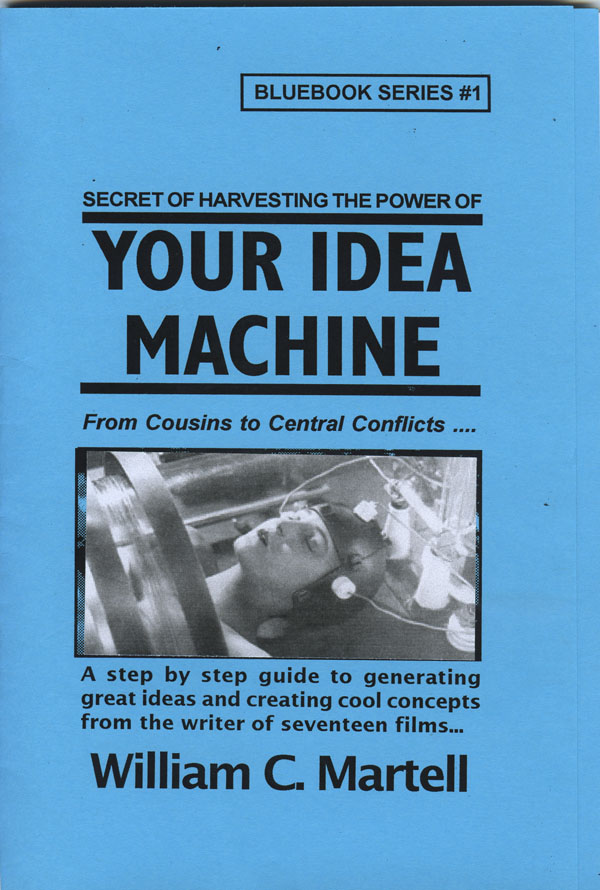
FIND A GREAT IDEA!
*** YOUR IDEA MACHINE ***
Expanded version with more ways to find great ideas! Your screenplay is going to begin with an idea. There are good ideas and bad ideas and commercial ideas and personal ideas. But where do you find ideas in the first place? This handbook explores different methods for finding or generating ideas, and combining those ideas into concepts that sell. The Idea Bank, Fifteen Places To Find Ideas, Good Ideas And Bad Ideas, Ideas From Locations And Elements, Keeping Track Of Your Ideas, Idea Theft - What Can You Do? Weird Ways To Connect Ideas, Combing Ideas To Create Concepts, High Concepts - What Are They? Creating The Killer Concept, Substitution - Lion Tamers & Hitmen, Creating Blockbuster Concepts, Magnification And The Matrix, Conflict Within Concept, Concepts With Visual Conflict, Avoiding Episodic Concepts, much more! Print version is 48 pages, Kindle version is over 175 pages!
Only $4.99 - Kindle Version
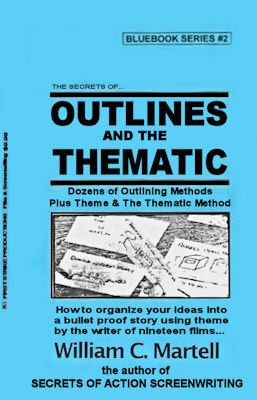
FIGURE OUT YOUR STORY!
*** OUTLINES & THE THEMATIC ***
Your story is like a road trip... but where are you going? What's the best route to get there? What are the best sights to see along the way? Just as you plan a vacation instead of just jump in the car and start driving, it's a good idea to plan your story. An artist does sketches before breaking out the oils, so why shouldn't a writer do the same? This Blue Book looks at various outlining methods used by professional screenwriters like Wesley Strick, Paul Schrader, John August, and others... as well as a guest chapter on novel outlines. Plus a whole section on the Thematic Method of generating scenes and characters and other elements that will be part of your outline. The three stages of writing are: Pre-writing, Writing, and Rewriting... this book looks at that first stage and how to use it to improve your screenplays and novels.
Only $4.99 - Kindle Version
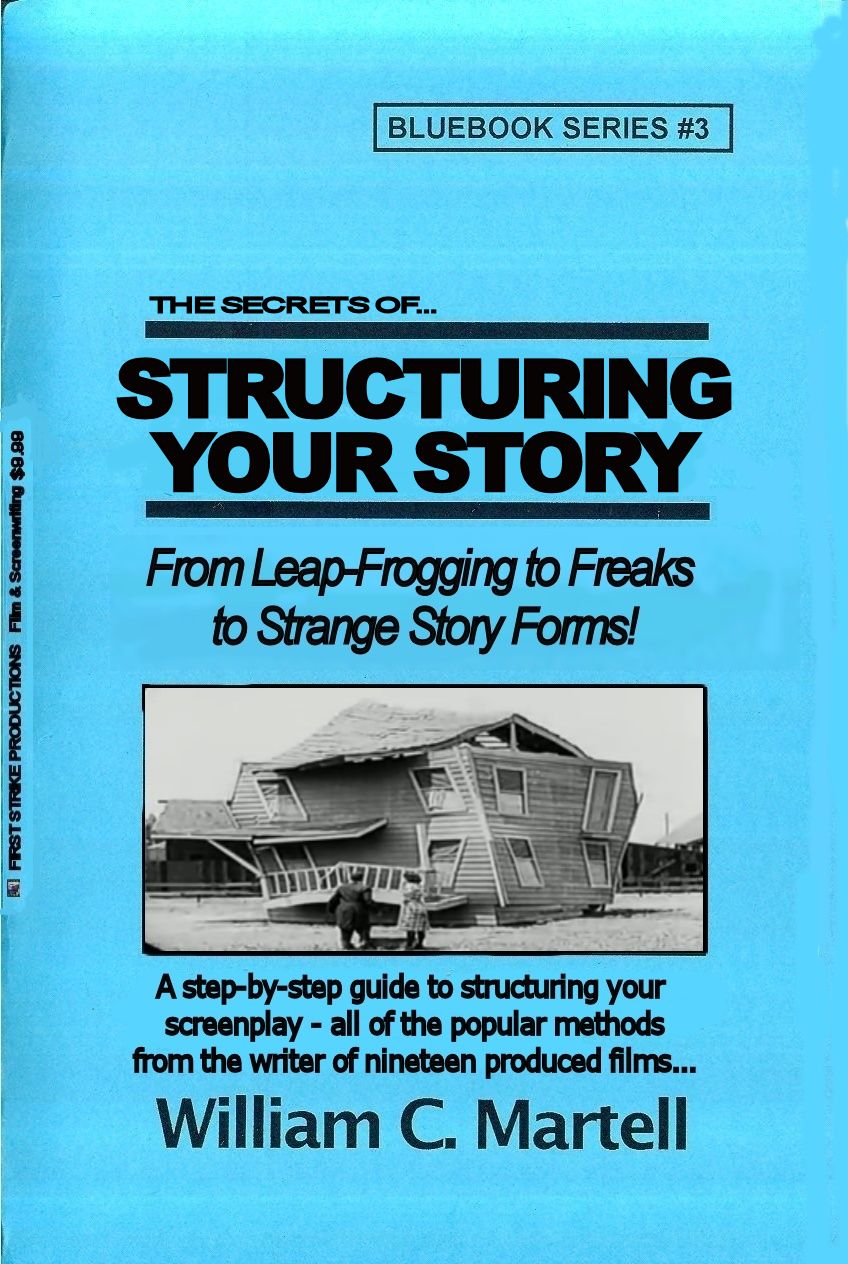
GOT STRUCTURE?!
*** STRUCTURING YOUR STORY ***
William Goldman says the most important single element of any screenplay is structure. It’s the skeleton under the flesh and blood of your story. Without it, you have a spineless, formless, mess... a slug! How do you make sure your structure is strong enough to support your story? How do you prevent your story from becoming a slug? This Blue Book explores different types of popular structures from the basic three act structure to more obscure methods like leap-frogging. We also look at structure as a verb as well as a noun, and techniques for structuring your story for maximum emotional impact. Most of the other books just look at *structure* and ignore the art of *structuring* your story. Techniques to make your story a page turner... instead of a slug!
Only $4.99 - Kindle Version

STORY: WELL TOLD!
*** STORY: WELL TOLD ***
This book takes you step-by-step through the construction of a story... and how to tell a story well, why Story always starts with character... but ISN'T character, Breaking Your Story, Irony, Planting Information, Evolving Story, Leaving No Dramatic Stone Unturned, The Three Greek Unities, The Importance Of Stakes, The Thematic Method, and how to create personal stories with blockbuster potential. Ready to tell a story?
Print version was 48 pages, Kindle version is over 85,000 words - 251 pages!
Only $4.99 - Kindle Version

HOW DO I DO THAT?
*** 101 SCREENWRITING ANSWERS ***
New to screenwriting? You probably have questions! How do I get an Agent? How do I write a phone conversation?
Do I need a Mentor? What’s does VO and OC and OS mean? What is proper screenplay format?
Should I use a pen name? Do I need to movie to Hollywood? What’s the difference between a
Producer and a Production Manager, and which should I sell my script to? How do I write a Text Message?
Should I Copyright or WGA register my script? Can I Direct or Star? How do I write an Improvised scene?
Overcoming Writer’s Block? How do I write a Sex Scene? And many many more! This book has the answers to
the 101 Most Asked Questions from new screenwriters! Plus a Glossary of terms so that you can sound like a pro!
Everything you need to know to begin writing your screenplay!
Only $4.99 - Kindle Version
NO KINDLE REQUIRED! Get the *free* app (any device, except your Mr. Coffee) on the order page on Amazon!

START STRONG!
*** HOOK 'EM IN TEN ***
Your story doesn't get a second chance to make a great first impression, and this book shows you a
bunch of techniques on how to do that. From the 12 Basic Ways To Begin Your Story, to the 3 Stars Of
Your First Scene (at least one must be present) to World Building, Title Crawls, Backstory, Starting
Late, Teasers and Pre Title Sequences, Establishing Theme & Motifs (using GODFATHER PART 2), Five Critical
Elements, Setting Up The Rest Of The Story (with GODFATHER), and much more! With hundreds of examples
ranging from Oscar winners to classic films like CASABLANCA to some of my produced films (because
I know exactly why I wrote the scripts that way). Biggest Blue Book yet!
Print version was 48 pages, Kindle version is over 100,000 words - 312 pages!
Only $4.99 - Kindle Version
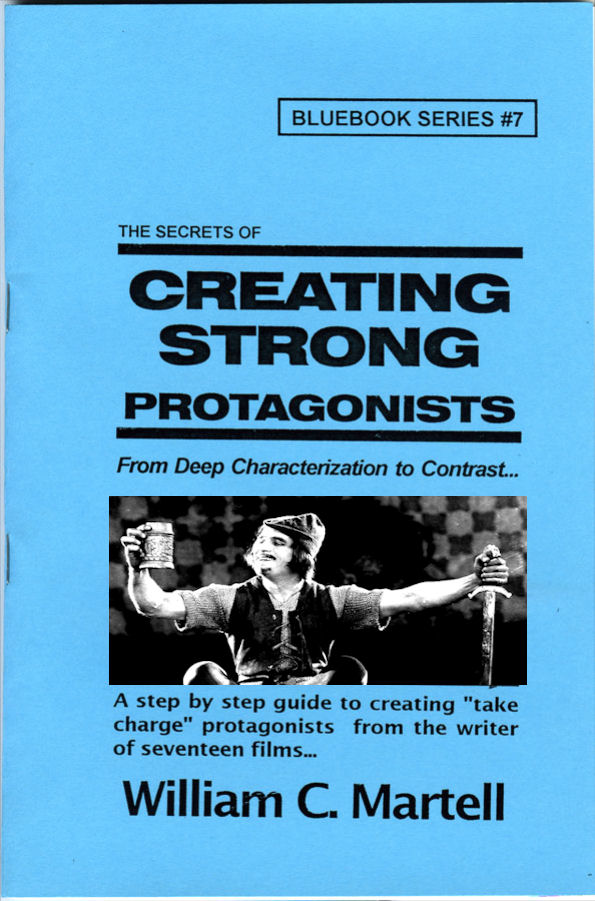
MOVIES ARE CHARACTERS!
*** CREATING STRONG PROTAGONISTS ***
Expanded version with more ways to create interesting protagonists! A step-by-step guide to creating "take charge" protagonists. Screenplays are about characters in conflict... characters in emotional turmoil... Strong three dimensional protagonists who can find solutions to their problems in 110 pages. But how do you create characters like this? How do you turn words into flesh and blood? Character issues, Knowing Who Is The Boss, Tapping into YOUR fears, The Naked Character, Pulp Friction, Man With A Plan, Character Arcs, Avoiding Cliche People, Deep Characterization, Problem Protagonists, 12 Ways To Create Likable Protagonists (even if they are criminals), Active vs. Reactive, The Third Dimension In Character, Relationships, Ensemble Scripts, and much, much more. Print version is 48 pages, Kindle version is once again around 205 pages!
ONLY $4.99 - Kindle Version
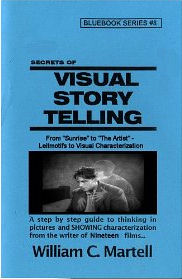
I WRITE PICTURES!
*** VISUAL STORYTELLING *** - For Kindle! (exclusive)
Show Don't Tell - but *how* do you do that? Here are techniques to tell stories visually! Using Oscar Winning Films and Oscar Nominated Films as our primary examples: from the first Best Picture Winner "Sunrise" (1927) to the Oscar Nominated "The Artist" (which takes place in 1927) with stops along the way Pixar's "Up" and Best Original Screenplay Winner "Breaking Away" (a small indie style drama - told visually) as well as "Witness" and other Oscar Winners as examples... plus RISE OF THE PLANET OF THE APES. Print version is 48 pages, Kindle version is over 200 pages!
ONLY $4.99 - Kindle Version
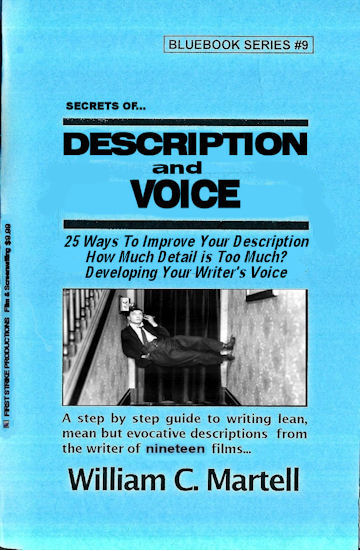
*** DESCRIPTION & VOICE ***
IS HALF OF YOUR STORY IN TROUBLE?
Most screenplays are about a 50/50 split between dialogue and description - which means your description is just as important as your dialogue. It just gets less press because the audience never sees it, the same reason why screenwriters get less press than movie stars. But your story will never get to the audience until readers and development executives read your script... so it is a very important factor. Until the movie is made the screenplay is the movie and must be just as exciting as the movie. So how do you make your screenplay exciting to read? Description is important in a novel as well, and the “audience” does read it... how do we write riveting description?
Only $4.99 Kindle version

PRO DIALOGUE TECHNIQUES!
*** DIALOGUE SECRETS ***
Expanded version with more ways to create interesting dialogue! How to remove bad dialogue (and what *is* bad dialogue), First Hand Dialogue, Awful Exposition, Realism, 50 Professional Dialogue Techniques you can use *today*, Subtext, Subtitles, Humor, Sizzling Banter, *Anti-Dialogue*, Speeches, and more. Tools you can use to make your dialogue sizzle! Special sections that use dialogue examples from movies as diverse as "Bringing Up Baby", "Psycho", "Double Indemnity", "Notorious", the Oscar nominated "You Can Count On Me", "His Girl Friday", and many more! Print version is 48 pages, Kindle version is over 175 pages!
Only $4.99 - Kindle Version
NO KINDLE REQUIRED! Get the *free* app (any device, except your Mr. Coffee) on the order page on Amazon!

WHAT IS A SCENE?
*** SCENE SECRETS ***
What is a scene and how many you will need? The difference between scenes and sluglines. Put your scenes on trial for their lives! Using "Jaws" we'll look at beats within a scene. Scene DNA. Creating set pieces and high concept scenes. A famous director talks about creating memorable scenes. 12 ways to create new scenes. Creating unexpected scenes. Use dramatic tension to supercharge your scenes. Plants and payoffs in scenes. Plus transitions and buttons and the all important "flow"... and more! Over 65,000 words! Print version was 48 pages, Kindle version is around 210 pages!
Only $4.99 - Kindle version
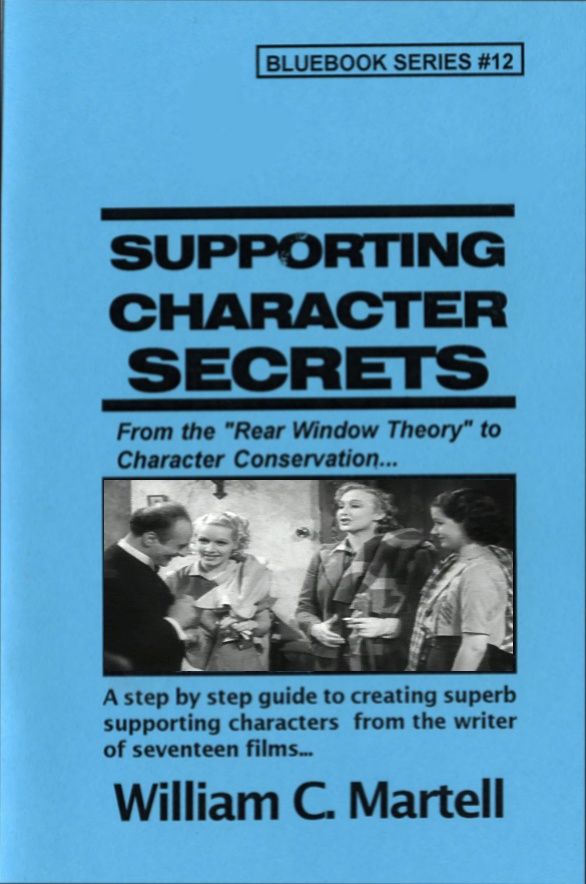
SUBPLOTS?
*** SUPPORTING CHARACTER SECRETS ***
Expanded version with more techniques to flesh out your Supporting Characters and make them individuals. Using the hit movie BRIDESMAIDS as well as other comedies like THE HANGOVER and TED and HIGH FIDELITY and
40 YEAR OLD VIRGIN and many other examples we look at ways to make your Supporting Characters come alive on the page.
Print version was 48 pages, Kindle version is around 170 pages!
ONLY $4.99 - Kindle version
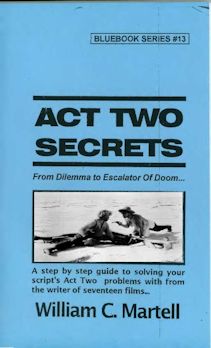
ACT TWO SOLUTIONS!
*** ACT TWO SECRETS ***
Expanded version with more techniques to help you through the desert of Act Two! Subjects Include: What Is Act Two? Inside Moves, The 2 Ps: Purpose & Pacing, The 4Ds: Dilemma, Denial, Drama and Decision, Momentum, the Two Act Twos, Subplot Prisms, Deadlines, Drive, Levels Of Conflict, Escalation, When Act Two Begins and When Act Two Ends, Scene Order, Bite Sized Pieces, Common Act Two Issues, Plot Devices For Act Two, and dozens of others. Over 67,000 words (that’s well over 200 pages) of tools and techniques to get you through the desert of Act Two alive!
Print version was 48 pages, Kindle version is well over 200 pages!
ONLY $4.99 - Kindle version

Can You Make It bigger?
***BLOCKBUSTERS (and BEACH READS) ***
Thinking about writing a big Disaster Movie? An Historical Epic? An Epic Adventure Film? Or maybe you like Gladiator Movies? This book looks at writing Blockbusters and those Big Fat Beach Read novels - anything epic! Usng movies like JAWS, POSEIDON ADVENTURE, LAWRENCE OF ARABIA, THE GUNS OF NAVARONE, and those MARVEL and FAST & FURIOUS flicks as examples. What *is* a Blockbuster? 107 years of Blockbuster history! Blockbuster Characters. Blockbuster Story Types! Why modern Blockbusters are soap operas! Social Issues in Blcokbusters? Big Emotions! Keeping All Of Those Characters Distinctive! How to avoid the Big problems found in Big Movies and books! More! If you are writing a Big Event Movie or a Big Fat Novel, there are tips and techniques to help you!
ONLY $4.99 - Kindle Version
NO KINDLE REQUIRED! Get the *free* app (any device, except your Mr. Coffee) on the order page on Amazon!
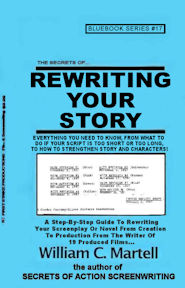
All About Rewrites!
*** REWRITES Blue Book! ***
When You Finish Your Screenplay Or Novel...
The Rewrites Begin!
The end is just the beginning! You’ve finished your story, but now the rewriting begins! This 405 page book
shows you how to rewrite your screenplay or novel to perfection. Everything from Character Consistency to
Shoeboxing to How To Give And Receive Notes to 15 Solutions If Your Script’s Too Long! and 15 Solutions
If Your Script’s Too Short! to Finding The Cause Of A Story Problem to Good Notes Vs. Bad Notes to Finding
Beta Readers to Avoiding Predictability to Learning To Be Objective About Your Work to Script Killer Notes and
Notes From Idiots to Production Rewrites and What The Page Colors Mean? and a Complete Rewrite Checklist!
The complete book on Rewriting Your Story!
Only $4.99 - Kindle Version

Want To Look Like An Expert?
*** RESEARCH & WORLD BUILDING BUILDING! ***
Using movie examples like TOP GUN, HUNT FOR RED OCTOBER, BLUE CRUSH, ADVENTURE LAND, several of my produced films,
JOHN WICK, the novels of Donald E. Westlake and Thomas B. Dewey, SPY KIDS, the LORD OF THE RINGS movies, SOYLENT GREEN
(which takes place in the far off future of 2022), and many others we will look at researching stories and creating worlds.
The 8 Types Of Research, the 10 Types Of Information To Look For, 12 Important Elements Of World Building. Plus chapters on How
To Rob A Bank and Commit Murder And Get Away With It for those of you interested in crime fiction, and Researching The Future
for those writing science fiction, and Levels Of Reality if you are writing about a version of the real world.
Only $4.99 - Kindle Version
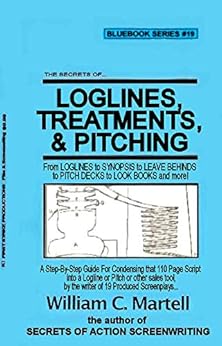
All About LOGLINES, TREATMENTS, and PITCHING!
*** LOGLINES, TREATMENTS, and PITCHING! ***
You have written a brilliant 110 page screenplay, but how do you get anyone to read it? You need to distill
it down into some form of verbal moonshine or story rocket fuel that will ignite that bored development executive
or manager or agent and get them to request your screenplay. But how do you shrink those 110 pages into a 25
word logline or a 2 minute elevator pitch or a one page synopsis or a short paragraph? This 100,000 word book
shows you how! Everything you need to know! From common logline mistakes (and how to solve them) to how
your pitch can reveal story problems to the 4 types of pitches!
ONLY $4.99! - Kindle version.
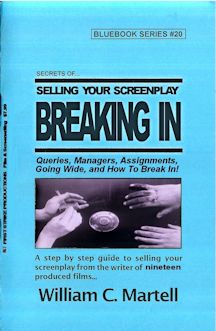
READY TO BREAK IN?
*** BREAKING IN BLUE BOOK ***
Should really be called the BUSINESS BLUE BOOK because it covers almost everything you will need to
know for your screenwriting career: from thinking like a producer and learning to speak their language,
to query letters and finding a manager or agent, to making connections (at home and in Hollywood) and
networking, to the different kinds of meetings you are will have at Studios, to the difference between
a producer and a studio, to landing an assignment at that meeting and what is required of you when you
are working under contract, to contracts and options and lawyers and... when to run from a deal!
Information you can use *now* to move your career forward! It's all here in the Biggest Blue Book yet!
Only $4.99 - Kindle version.

STORY IN ACTION SERIES!

THE MISSION IMPOSSIBLE MOVIES
NEW: Updates On Films 7 & 8 Casting!
The First Six Movies analyzed! All of the mission tapes, all of the “that’s impossible!” set pieces and stunts, the cons and capers - and how these scenes work, the twists and double crosses, the tension and suspense (and how to generate it), the concept of each film as a stand alone with a different director calling the shots (broken in the sixth film), the gadgets, the masks, the stories, the co-stars and team members (one team member has been in every film), the stunts Tom Cruise actually did (and the ones he didn’t), and so much more! Over 120,000 words of fun info!
THE MISSION IMPOSSIBLE MOVIES - 347 Pages -
Only $3.99 ! - Kindle Version

*** THE BOURNE MOVIES
All five "Bourne" movies (including "Legacy" and it's potential sequels) - what are the techniques used to keep the characters and scenes exciting and involving? Reinventing the thriller genre...
or following the "formula"? Five films - each with an interesting experiment! A detailed analysis of each
of the films, the way these thrillers work... as well as a complete list of box office and critical
statistics for each film. This book is great for writers, directors, and just fans of the series.
Only $3.99 - Kindle version
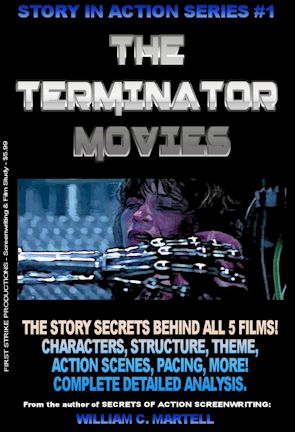
Over 240 pages!
*** THE TERMINATOR MOVIES ***
He's back! The release of "Terminator: Dark Fate" is set to begin a new trilogy in
the Terminator story... 35 years after the first film was released. What draws us to these films about
a cybernetic organism from the future sent back in time? Why is there a new proposed trilogy every few
years? This book looks at all five Terminator movies from a story standpoint - what makes them work
(or not)? What are the techniques used to keep the characters and scenes exciting and involving? How
about those secret story details you may not have noticed? Containing a detailed analysis of each of
the five films so far, this book delves into the way these stories work... as well as a complete list of
box office and critical statistics for each film. This book is great for writers, directors, and just
fans of the series.
ONLY $3.99 - Kindle Version
FICTION
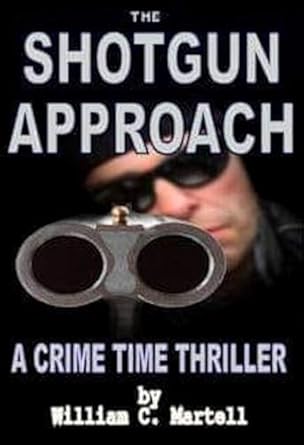
Featuring Shelly Steele !
*** THE SHOTGUN APPROACH ***
A Pop Star is murdered on the VIP floor of a luxury hotel by a shotgun blast to the face... completely ruining an original piece of art
on the wall behind him. Violent SFPD Homicide Inspector Shelly Steele must find the murderer... without killing anyone in the process.
That won't be easy! A locked room, A handful of clues. A chase and shootout on the hotel's fire stairs.
Who is the killer? His ex-Partner? His ex-Wife? His ex-Record Label Owner?
THE SHOTGUN APPROACH 105 pgs!
ONLY $.99 - Kindle Version
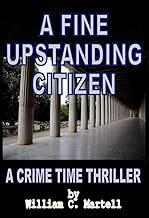
Featuring Smart & Final !
*** A FINE UPSTANDING CITIZEN ***
25 years ago Senator Milano killed a man. Now he's one of a dozen suspects in an information leak.
Being interrogated in the executive boardroom on the 30th floor of an office building...
The informant will not be leaving by the elevator. Can he solve the crime before they discover his secret?
Fnd the rat before the trap springs on him?
A FINE UPSTANDING CITIZEN (CRIME TIME THRILLER) 86 pgs!
ONLY $.99 - Kindle Version

Crime Time Thriller !
*** FOLLOWED HOME ***
Bowden knew the best place to find a victim is somewhere they feel safe. Diane Taylor would be his next victim...
It began with a car jacking at an upscale grocery store, but fresh out of prison Bowden decided to take everything -
forcing Diane to drive him her her luxury home. Trapped in her SUV with a violent man, can she find a way to turn the tables on him and survive?
FOLLOWED HOME (CRIME TIME THRILLER)
ONLY $.99 - Kindle Version

Featuring Smart & Final !
*** PRIME RATE ***
Chuck Skinner brought his father's failing butcher shop back into the black with the help of modern day cattle rustlers. Nice story if it ends there...
But now the head of the MaryAnn Mob of cattle rustlers suspects him of cooking his books, and has brought in an "accountant"
nicknamed Smart & Final... to hold him accountable. Can Chuck talk his way out of this?
PRIME RATE (CRIME TIME THRILLER)
ONLY $.99 - Kindle Version
MITCH ROBERTSON MYSTERIES

Mitch Robertson #1
*** THROUGH THE RINGER ***
Screenwriter Mitch Robertson just wants to sell a script, but ends up solving the mystery of a whiz kid writer whose new script stinks.
From an upscale vodka bar in Beverly Hills to the Writer's Guild Library to an old mansion in the woodsy Brentwood district, Mitch follows
the clues to uncover the secret of the hot new writer who has suddenly turned cold.
THROUGH THE RINGER
ONLY $.99 - Kindle Version
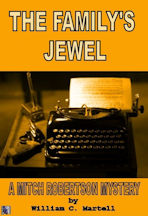
Mitch Robertson #2
*** THE FAMILY'S JEWEL ***
"The Presidential Suite of the Hollywood Hoover Hotel looked like a bloody battlefield: bodies everywhere, furniture broken, red liquid dripping from the walls, dead soldiers littering the elegant Berber rug as clouds of smoke overhead bounced between two air conditioning vents.
Mitch Robertson stepped over the body of an ex-child star turned sex tape star turned pop star and entered the room, spotted a gun on the floor and picked it up... careful not to spill his coffee with three pumps of mocha syrup from Penny’s Coffee Shop. That coffee was gold, the only thing keeping him going in this dazed state of wakefulness. The gun felt light. Holding it, he saw the silhouette of an 80s action star sitting sideways on a tipped over chair. Motionless. Was he dead? Mitch was still hung over from the Awards Party the night before, and wondered whether this was all some sort of crazy nightmare that he would wake up from... but when he tripped over the brown legs of a bottomless Superhero, flaccid junk encased in a condom but still wearing his mask, and hit the edge of the sofa, gun skittering and coffee spilling, he realized that it was all very real. What the hell had happened here?"
Short Novel. Only 99 cents! - Kindle Version
NEW!
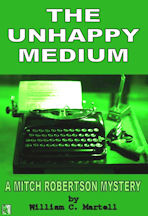
Mitch Robertson #3
*** THE UNHAPPY MEDIUM ***
When Warren Moultie, the "Psychic To The Stars", private files, with dirt on everyone in Hollywood, are stolen, Mitch must find them and the
thief before the blackmail begins! But when studios and movie stars and pop music stars and TV stars begin receiving demands for millions
typed by an ancient typewriter on cheap paper, the entire Entertainment Industry is depending on him. Who stole the files? The Psychic? His wife?
His mistress? One of his famous clients?
Novella. Only 99 cents! - Kindle Version


Use your creative energy to focus on the content; let Final Draft take care of the style. Final Draft is the number-one selling application specifically designed for writing movie scripts, television episodics and stage plays. Its ease-of-use and time-saving features have attracted writers for almost two decades positioning Final Draft as the Professional Screenwriters Choice. Final Draft power users include Academy, Emmy and BAFTA award winning writers like Oliver Stone, Tom Hanks, Alan Ball, J.J. Abrams, James Cameron and more.
* * * Buy It!

|

